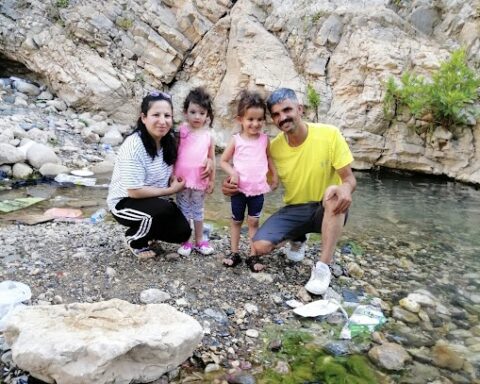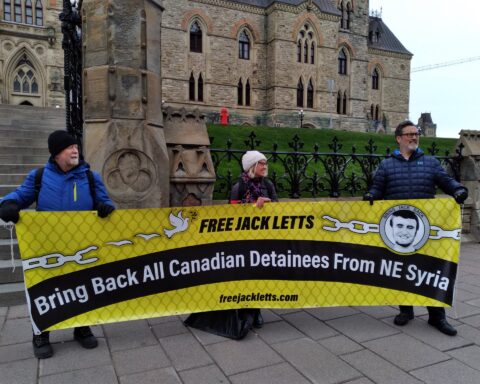![]() Warrant Officer Patrice Vincent and Cpl. Nathan Cirillo were both victims of radicalized Canadian citizens bent on killing a soldier.
Warrant Officer Patrice Vincent and Cpl. Nathan Cirillo were both victims of radicalized Canadian citizens bent on killing a soldier.
So why, in the year since the attacks in St. Jean-sur-Richelieu and Parliament Hill, has Ottawa ignored counter-radicalization programs?
The federal response has focused on hard security. The Harper government increased intelligence and enforcement powers through legislation. It also never wasted a chance to boast about its modest role in the U.S.-led military effort against the Islamic State in Iraq and Syria.
As Remembrance Day is an appropriate time to think about whether our support for veterans matches our willingness to empathize with their sacrifices, so should [Oct. 22’s] memorial event be an opportunity to ask ourselves whether Canada has responded to the threat of homegrown terrorism in the right way.
[Oct. 22’s] memorial event be an opportunity to ask ourselves whether Canada has responded to the threat of homegrown terrorism in the right way.
The answer, after 12 short months, is no — we haven’t.
Slow in response
Even before Martin Couture-Rouleau and Michael Zehaf-Bibeau became violent, Canada was slow compared to other developed nations in responding to the radicalization of its own citizens, say experts.
After the Syrian civil war gave roots to the social media-savvy Islamic State, things didn’t get much better. Programs aimed at helping communities identify and help youth at risk of falling into radicalization – or deal with them once they had begun to indulge in radical views – were lacking.
After last fall’s attacks, the federal government promised a counter-radicalization strategy. It never happened.
After last fall’s attacks, the federal government promised a counter-radicalization strategy. It never happened. Instead, Canadians got the Anti-terrorism Act (C-51), with its increase in surveillance powers.
Experts who testified during committee hearings on the bill protested that counter-radicalization – the work of preventing terrorism rather than just responding to it – wasn’t receiving a mention. Again, they were told to wait.
The Conservatives were booted from power before a strategy could be released. The Liberal party, which won a majority government in Monday’s general election, promised to appoint a national counter-radicalization coordinator to work with religious communities and make sure on-the-ground initiatives are getting the support they need.
Hopefully, the new government will fulfill this promise and use it as a springboard to renew counter-radicalization programs. It would be a fitting tribute to Vincent and Cirillo.
A noxious atmosphere for Muslim Canadians
There is another measure the new government should take today — related to the debate over security, but distinct from it.
Intentionally or not, the militarized climate of the past year took shape while the Conservatives pursued another agenda. From unnecessary legislation aimed at curbing ‘barbaric cultural practices’ to the vilification of the niqab, the Conservatives tried to dictate the social and cultural mores of Canadians in the name of values and the rule of law.
A Senate Committee on National Security and Defence report, chaired by a Conservative, even recommended the government get into the business of licensing imams.
The security effort and the culture war combined to create a noxious atmosphere for Muslim Canadians.
“Are we made less safe when we engage in this alienation narrative? Absolutely.”
“Are we made less safe when we engage in this alienation narrative? Absolutely,” said Mubin Shaikh, the former CSIS informant who helped stop the Toronto 18 terrorist plot, in an interview with The Tyee in March.
“I was the agent on the Toronto 18, and the Via Rail plot information was given by a Canadian imam,” he said. “So why do they leave that part out? Then Muslims are made to feel like we gave the information that leads to the arrests, but it’s still our fault? What message is that sending?”
The federal terrorism response has focused too much on a single group — Muslims — instead of on the complex motivations behind homegrown terrorists like Couture-Rouleau and Zehaf-Bibeau.
Incidentally, understanding individual actors is the key to counter-radicalization since their motivations are poorly understood.
Experts say there is no overarching theory that explains why some people commit acts of terrible violence in the name of an idea. But they do say a good counter-radicalization effort has to focus on responding to individuals. The best way to get ahead in that regard is to do a better job of enlisting communities in the effort.
Today, whether in words or actions, the incoming Liberal government should try to signal that Muslim communities in Canada must be an important part of stopping attacks like the one that happened in Ottawa one year ago.
Published in partnership with iPolitics.ca.




